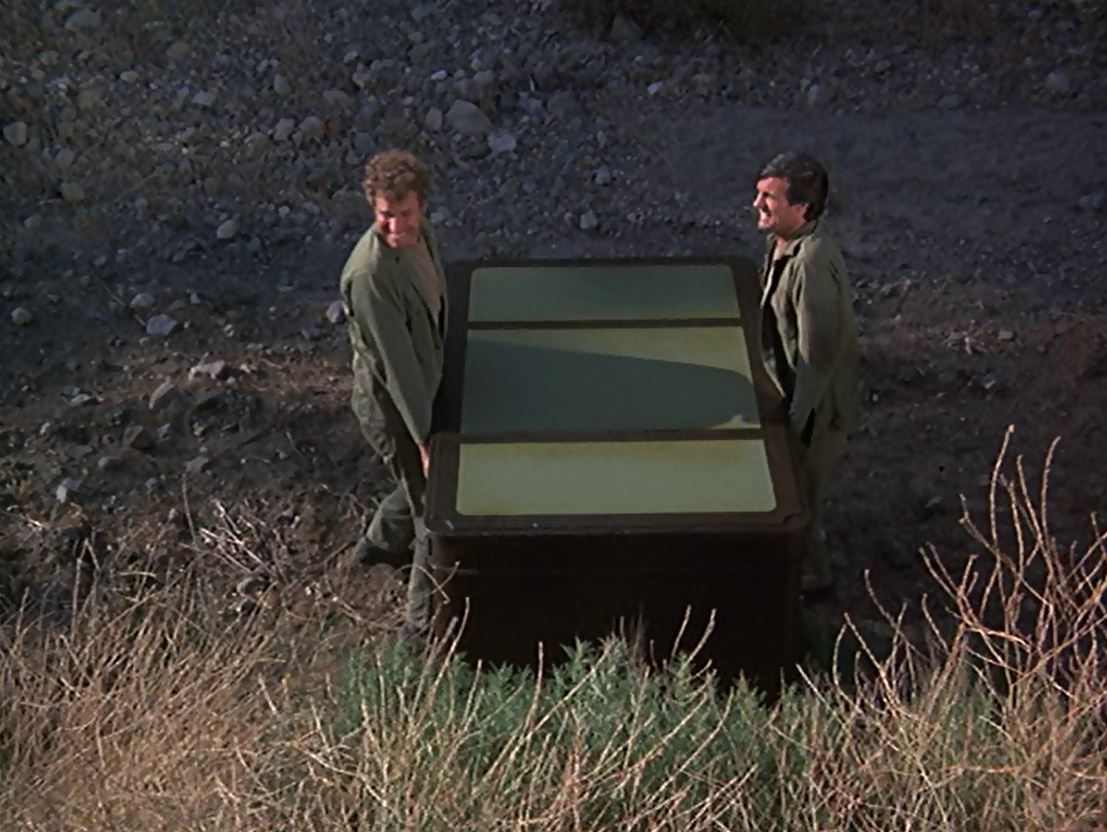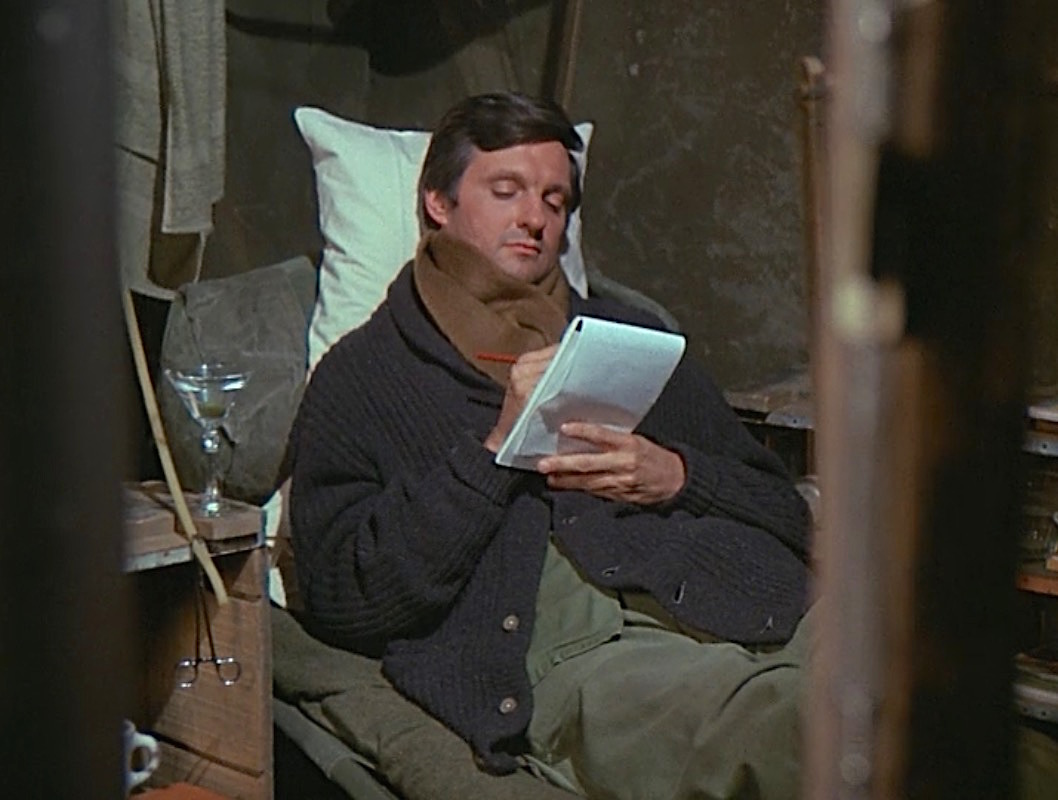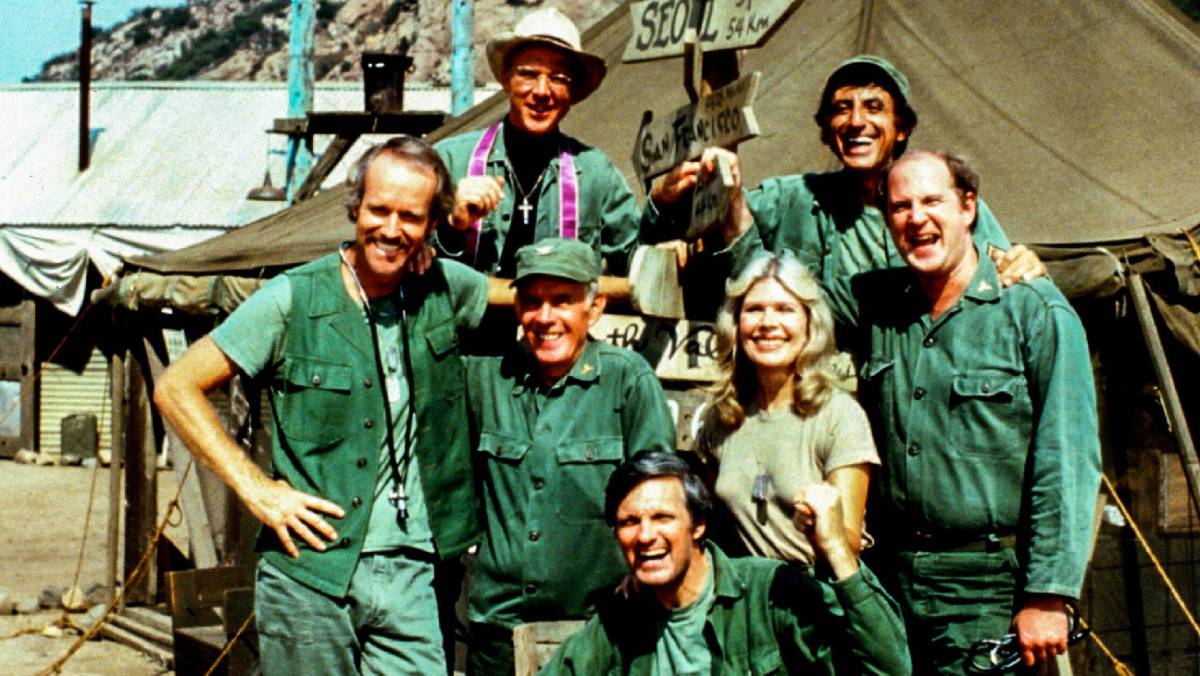Last week, a student that I work with tested positive for Covid-19, and I was forced into a 10-day quarantine. Thankfully, I returned two negative tests, but I was pretty wigged out for those first few days. I couldn’t stop thinking of the potential consequences if I got the virus, and I needed a way to turn that anxiety off. So, I turned to one of my favorite shows: “M*A*S*H.”
This 1970s TV hit takes place at the US Army’s 4077th M*A*S*H unit, a Mobile Army Surgical Hospital during the Korean War. Each episode shows the camp’s doctors and nurses, the majority of them draftees, doing their best to save wounded soldiers and keep their sanity while they do it. Between the antics, the honesty, and the humanity of the show, it quickly became the gold standard for an American sitcom.
Unfortunately, this week when I turned to the show to distract myself from the coronavirus-blues, all I could think about was how similar the situations in certain episodes are to what we’re still struggling with in the United States. So, crank up that still, take a belt and strap in. Here are the three strongest parallels I found between 11 seasons of “M*A*S*H” and 12 months of Covid-19.
The Medical Burden

For an entire year now, doctors and nurses across the country have been working overtime in crowded hospitals, putting their lives on the line to combat this deadly virus. The medical profession was already a difficult one, and it has only become harder as this pandemic has dragged on.
Last April, healthcare workers faced this novel challenge without many of the necessities they needed. Nationwide ventilator shortages left patients gasping for air. Mask shortages left medical personnel dangerously unequipped. Personnel shortages left hospitals critically understaffed.
But all of those shortages reminded me of M*A*S*H episodes where characters have to scramble to find necessities for the camp. In ‘To Market, to Market,’ Hawkeye and Trapper (played by Alan Alda and Wayne Rogers respectively) have to turn to the black market to find hydrocortisone. Is that not like the early days of covid, when we found ourselves scrambling to find household goods after hoarders bought up all the toilet paper in town?
At that point in the pandemic, many of us also had to pick up a needle and thread to make our own masks. That same type of resourcefulness comes in handy a few times in “M*A*S*H” as the doctors have to find innovative ways to treat their ailing patients. In the episode ‘C*A*V*E,’ the medical staff creates an improvised cast and sling for a patient out of a set of crutches. In the ‘Patent 4077’ episode, they enlist the help of a Korean engineer to help invent a new type of surgical clamp.
However, while most of us were quarantined at home during the early stages of the pandemic, travel nurses had to pack their bags and venture into coronavirus hotspots. That’s not unlike what happens in ‘Aid Station,’ when a Korean medical unit finds themselves short-handed.
“They’re screaming for supplies and surgeons,” Colonel Potter, played by Harry Morgan, tells his staff.
“They’re up to their scalpels in casualties,” Hawkeye jokes back. An interesting fact about this episode: the Korean medical unit is led by a character named Major Choi, who was played by famous Japanese actor Mako. Although he appeared multiple times in different roles on M*A*S*H, Mako may be best known to modern audiences for his work as Uncle Iroh in the first two seasons of Avatar: The Last Airbender.
In another episode, ‘Carry on Hawkeye,’ an outbreak of flu sidelines almost all of the doctors in camp; at one point, Hawkeye gets on the phone to request help, yelling, “I realize that flu is an epidemic in the whole theater, but I’m all alone here! Just send me some hands!”
And, like the characters on TV, we’ve somehow found a way to keep fighting this medical enemy. Businesses have bucked up and made more ventilators. Communities have come together to provide for those who need it most. Doctors and nurses have uprooted their lives, working days on end and isolating themselves, all to protect the rest of us from this virus.
What We’ve Missed

Over the past year, many of us haven’t been able to see our families. We’ve missed holidays, graduations and the opportunity to watch our loved ones grow. It’s been a strange, disappointing and anxiety-riddled year, but at least we’re not in a war zone. How do you think Korean war draftees felt?
Mike Farrell, playing Captain B.J. Hunnicutt, gives vent to that frustration in an episode of M*A*S*H titled ‘Period of Adjustment’. In an argument with Hawkeye, B.J. struggles to come to terms with the time he’s spent away from his infant daughter, demoralized that he’s missing her first steps, her first words, her first few years of life.
Other characters say much of the same when they write letters home. There are three ‘Dear Dad’ episodes where Hawkeye writes to his father. Jamie Farr as Corporal Klinger writes home to his Uncle Abdul. The camp chaplain even gets in on the action, as Father Mulcahy (played by William Christopher) writes a letter to the convent to say hello to his sister, the Sister. In each of these episodes, different characters lambast the distance between Korea and home, and let their families know how much they are missed.
Unfortunately, this is an everyday reality for thousands of American service members who miss out on being with their families while deployed. With coronavirus, an even larger number of people are dealing with a similar challenge. There are grandparents all across the world who are yet to meet their grandchildren. The children of doctors and nurses are missing their parents while those parents fight to contain this disease. The families of more than 500,000 dead Americans are left to mourn as the death toll keeps rising.
But while we’re all waiting for this pandemic to end, we still don’t know what life is going to look like on the other side of this thing. Until we can settle into that new normal, we’ve had to use some covid-safe ways to get our kicks. And Zoom parties might be the new rage for us, but M*A*S*H figured that one out fifty years ago.
In an episode titled, ‘The Party,’ B.J. arranges a reunion in NYC for all the families back home. To everyone stuck in Korea, it’s an opportunity to live vicariously through the letters they get back about the event. In reading about the dancing, the saxophone playing, and all the love shared between their family members halfway across the world, the members of the 4077 are able to find a few moments of joy despite the brutality of the war that still surrounds them.
We may be using computers instead of letters to connect with our loved ones, but the emotion remains the same. Every time I join a Zoom call and have a virtual drink with my friends, I’m able to find some happiness despite the horror of this pandemic.
All We’ve Taken for Granted
https://www.dailymotion.com/video/x6t0gpj
I think one of the most poignant M*A*S*H episodes of the entire series is ‘Out of Sight, Out of Mind’. While fixing a heater for the camp nurses, a freak explosion causes Hawkeye to go temporarily blind, and he’s forced to spend a week contemplating a future without his eyes.
Early in the episode, Hawkeye is stumbling around and trying to treat patients by instinct alone when he encounters a blind soldier. The man was injured when a grenade went off in front of him, and it’s implied that he’ll never be able to see again.
“Look, you’re alive,” Hawkeye tells the man. “Maybe you should feel lucky.”
“Do you feel lucky, Hawkeye?” he responds.
“Not lately,” Hawkeye says back.
Lately, I haven’t been feeling too lucky either. I currently work as a substitute teacher and a grant employee in a public middle school. I consider myself fairly good at what I do, but it’s difficult and not what I want to be doing. My commute is too long. My alarm goes off too early. Last week I was home stressing about a possible exposure to coronavirus and struggling to teach the faces in my computer screen. It feels to me like I’ve had it rough.
But the fact I even have a job during this pandemic should be cause for celebration. The fact that I’ve made it through one of the world’s most deadly events since the 1918 influenza epidemic without losing any of my family members is an unbelievable stroke of luck. The way we’re getting shots into arms and rounding the corner on this pandemic should be enough to make me jump for joy, but instead I still feel restless.
Hawkeye acts the same way for his first days as a blind man. He spends a good portion of the episode complaining to anyone who will listen and lamenting everything he can’t do. But then, he has a change of heart.
“Something fascinating’s been happening to me,” Hawkeye says to B.J. “One part of the world is closed down for me, but another part has opened up.”
“This morning I spent two incredible hours listening to that rainstorm,” he continues. “And I didn’t just hear it, I was part of it. I bet you have no idea that rain hitting the ground makes the same sound as steaks when they’re barbecuing. Or that thunder seems to echo forever. And you wouldn’t believe how funny it is to hear somebody slip and fall in the mud. Beej, this is full of trap doors, but I think there may almost be some kind of advantage in this. I’ve never spent a more conscious day in my life.”
The episode is a lesson in patience and in being present. The show’s main character has to slow down and appreciate all of the things that we as viewers have been seeing on screen but have yet to notice ourselves. He learns to appreciate the sounds and smells of the 4077 as opposed to just the sights. He learns to use all five of his senses in surgery. The usual cynicism that he displays dissipates, and is replaced with a cognizance of all the good fortune that he enjoys.
When Hawkeye’s eyesight comes back at the end of the episode, it serves as an opportunity for characters and viewers alike to take stock of what they’re grateful for. He remarks, “I got lucky twice. First, I got the chance to see without my eyes, and then I got them back.”
With Hawkeye’s realization in mind, I had to consider how difficult this school year must have been for the students I work with. These kids are either in the building with masks on, or at home on zoom calls for seven hours each day. They’ve been denied the opportunity to use their lockers or hang out with friends. Most of their extracurricular activities, teams and clubs were cancelled for the year. I thought it was hard enough dealing with the stresses of middle school when I was a kid. I can’t imagine how tough this year has been for them.
Now, I’m not writing this to tell anyone else to be grateful. I know that over the past year, so many people have lost family members, have lost jobs, have lost a little piece of their sanity. I know that the collective trauma of this event is going to stay with us for years to come.
But just like Hawkeye with his temporary blindness, that week at home helped me to realize how good I really have it. I had already experienced the difficulties of working in person during this pandemic. Now, I have an idea of what it’s like on the other side, and I’m hoping I can be a better teacher because of it.
Besides, after a difficult day, I can always turn to an episode of M*A*S*H.
READ NEXT: 10 Best Post-Apocalyptic Shows You Should Watch
Some of the coverage you find on Cultured Vultures contains affiliate links, which provide us with small commissions based on purchases made from visiting our site.

